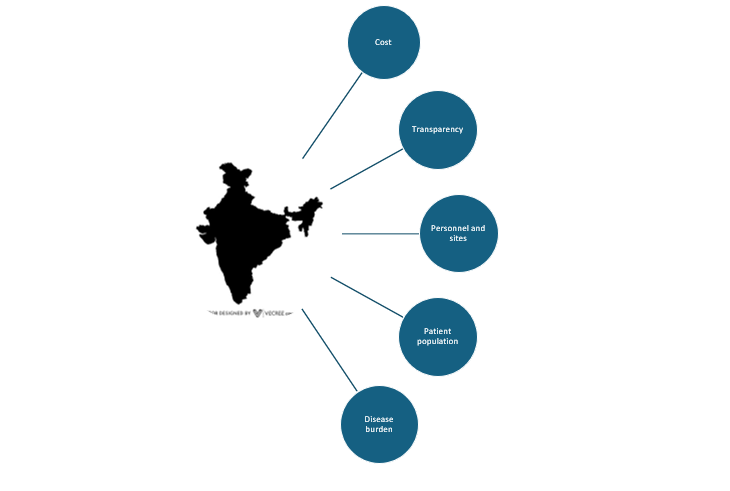With a population of approximately 1.4 billion people, healthcare expenditure of 2.6% of the country’s gross domestic product (GDP), and the presence of several multinational pharmaceutical and biopharmaceutical companies in India are some factors that have led to India being recognized as a hub for global clinical trials. A recent report showed that India accounted for 6.2% of global clinical trials in 2021 with a higher percentage of non-industry sponsored trials (59.4%) compared to industry sponsored ones (40.6%). Trials were conducted across various therapeutic areas such as infectious diseases, central nervous system (CNS) disorders, oncology, metabolic disorders, and respiratory illnesses. Depending upon the phase of the trial, higher percentages of phase II and III trials in both industry-sponsored and non-sponsored sectors were conducted in India. These data lend credence to the fact that India is an attractive destination for clinical trials across various therapeutics areas and phases.
The following are the reasons that India is emerging as an epicentre for global clinical trials
Cost
The cost of conducting clinical trials in India is estimated to be about 50% less than if the trial is run in the United States which is currently ranked the global leader for trials. Decreased operational costs, faster patient recruitment, easier and faster regulatory approval pathway, competitive pricing due to the large number of emerging contract research organizations (CROs), and government incentives and schemes are some of the reasons for overall lower costs compared to Western countries and other Asian countries.
Transparency
The Central Drugs Standard Control Organization (CDSCO) which is the regulatory authority for approval of drugs in India and the Drugs Controller General of India (DCGI) have made the registration of clinical trials mandatory through the Clinical Trial Registry India (CTRI). In addition to registration, the CTRI provides a structured format for dissemination of trial results that improve transparency and help avoid duplication of studies thus saving the scientific community money and resources while advancing medical knowledge which is recommended for use by all sponsors and investigators. The requirement for an ethics committee to approve all trials in human subjects and informed consent are the other aspects of creating trust and transparency in clinical trial conduct by ensuring the ethical conduct of trials through protection of patient rights and confidentiality.
Personnel and sites
Abundance of skilled and trained healthcare professionals,
well-equipped hospitals and hospital chains, modern infrastructure, English-speaking personnel, and world-class research facilities are attracting multinational pharmaceutical companies to conduct their trials in India as well as making India a premium destination for medical tourism. Cross-functional collaboration and researchers, investigators, nurses, and study coordinators that are well-versed with (GCP) Good Clinical Practice and ethical guidelines are important factors when choosing India for global trials.
Patient population
India boosts of a vast and diverse, treatment-naïve patient population allowing for easier and faster patient recruitment than Western countries as well as shorter trial timelines translating to lower operational costs. The significant economic divide and geographical diversity makes accessibility to patients having infectious and lifestyle disorders such as diabetes, cardiovascular diseases, and cancers more feasible. Since patient recruitment in a major challenge for a lot of trials, conducting trials in India can help overcome this roadblock.
Disease burden
The high prevalence of both communicable (infectious) and non-communicable diseases, high number of patients with rare diseases based on the large population, and the ability to study the effect of treatments on patients with genetic diversity in India are advantageous for carrying out clinical trials in the country.
Although several factors as listed above make India a sought-after destination for clinical trials, challenges such as unwillingness of patients to participate in trials due to lack of knowledge, patient safety and technology constraints remain. These can be overcome through comprehensive training programs for patients and investigators on regulatory guidelines, ethical conduct, and reporting issues.
References
- India accounts for 6.2% share of global clinical trial activity in 2021 – Clinical Trials Arena
- Clinical trials in India: Where do we stand globally? – PMC (nih.gov)
- Public disclosure of clinical trial results at Clinical Trial Registry of India- Need for transparency in research! – PMC (nih.gov)
- India’s next challenge: Rebooting recruitment – PMC (nih.gov)






